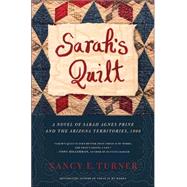
Note: Supplemental materials are not guaranteed with Rental or Used book purchases.
Purchase Benefits
What is included with this book?
| Praise for | |
| ""All the enduring elements of the mystery that is life on earth can be found between the pages of this book | |
| It is a perfectly authentic story, beautifully executed by its author."" | |
| author of Dances with Wolves | |
| ""Gritty Sarah Elliot, who lassoed our hearts in These Is My Words, proves that women as well as men tamed the West."" | |
| author of The Diary of Mattie Spenser ""Sarah Prine is the real article . . | |
| Table of Contents provided by Publisher. All Rights Reserved. |
The New copy of this book will include any supplemental materials advertised. Please check the title of the book to determine if it should include any access cards, study guides, lab manuals, CDs, etc.
The Used, Rental and eBook copies of this book are not guaranteed to include any supplemental materials. Typically, only the book itself is included. This is true even if the title states it includes any access cards, study guides, lab manuals, CDs, etc.